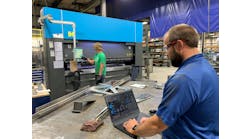Implementing new technology without the proper education and buy-in of the ultimate end users is a business fraught with difficulty. Here are some strategies for getting that buy-in. Operations is king in many, if not most process plants. While its the enterprise that writes our checks and keeps the other pipelines of money flowing, operators are the pilots of the process that produces the saleable products. When these products stop flowing or are scrapped, you know whose phone will be ringing at 7:30 a.m. Operations justifiably has a position of importance and focus. As controls professionals, its primarily operations that we serve. It is the main customer of the measurements we bring in, and the one whose hands are on the steering wheel we provide. Operations folks are a key group to educateand ideally, to transform into advocates of fieldbus.
Id consider a two-pronged approach, both top-down and bottom-up. Maybe your ops manager is skeptical about the abilities or motivation of his or her staff. This is the sort of situation where you might put less emphasis on empowerment opportunities, and more on the capability of the system to save the process independent of the person at the helm. See my July 2007 column, Not Jazzed about FieldbusTry It, for examples of how this is achieved with Foundation technology.
A better circumstance is one where the process superintendent entrusts his or her front-line operators with the plant, counting on them to make smart choices within the constraints of the process. To this person, you can emphasize the additional information available with digitally integrated smart field devices. Even before the last decade, operations have benefited from simple diagnostics that were part of proprietary schemes, like transmitter case temperatures. Fieldbus offers a great deal more.
There are plenty of experienced end users who can vouch for such benefits. At a refinery in Louisiana, after noticing that a critical loop appeared to have become less responsive, operators found a valve positioner whose feedback potentiometer had been smashed by a scaffold builder. Because the smart positioner had been configured to fail over to open loop pneumatic mode, the process went on uninterrupted.
The same sort of benefits can be used to gain the interest and support of the board people. For example, even HART valves can be configured to send the stem position (as seen by the positioner) to a system that supports native HART I/O. Foundation fieldbus devices transmit status every scan, so the notion that an electricians error wont send the plant into an upset should have a lot of appeal. The fact that new devices can alert users to common failures is worth bringing to managements attention.
If your ops organization is like mine, it tends to give more credence to the experiences of peers than the raves of the instrument guys or DCS types. Your favorite supplier should be able to come up with a reference site or two, one of which might be willing to host a contingent of your process operators and their bosses. These junkets have great value by virtue of shared experiences and the chance to get to know your ultimate customers better.
Ive had great success on projects, especially upgrades and retrofits, where I was able to get an experienced board person and/or front-line supervisor assigned to the job. Not only do these folks know the ropes of getting permits, isolating lines and running a loop on handwheel/bypass, theyre also tuned in to all the issues and personalities on the unit. They can help sort out the complaints that need urgent attention from the ones that can be deferred for later. They can also guide you to the long-standing irritations and bugaboos that can gain you some good will when you finally solve them.
Pay plenty of attention to these key customers. Their interest, care and support can go a long way toward getting the maximum benefits from your fieldbus projects.




